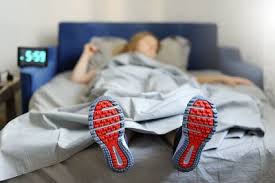Sleep: An athlete's ultimate recovery tool
- DR SARA FORSYTH

- Jan 1, 2021
- 4 min read
Updated: Jan 2, 2021
Normal human sleep comprises two main types—non-rapid eye movement sleep (non-REM) and REM sleep.
Non-REM sleep is divided into three stages, representing a continuum from ‘light’ sleep in stages 1 and 2, through to ‘deep’ sleep in stage 3. The duration and composition of normal sleep changes across the life cycle. For aspiring and established athletes, a sleep of 8–10hours for an adolescent (aged 15 years) contains approximately 57% light sleep, 22% deep sleep and 21% REM sleep; and a sleep of 7–9hours for a young adult (aged 30 years) contains approximately 61% light sleep, 16% deep sleep and 23% REM sleep.

Elite athletes are particularly susceptible to sleep inadequacy: habitual short and poor quality. Sleep disturbance may be a sign of or contributing to Under Recovery
Chronic under recovery predisposes athletes to overtraining syndrome, injury and mood disturbance. Sleep monitoring and education is an integral part of athlete support.
Sleep Hygiene
· Keep a regular sleep/wake schedule: go to bed at the same time and wake up at the same time with minimal variation.
· Limit time on devices prior to bedtime
· Eliminate late day caffeine
· Use your bed for sleep only, no studying or watching tV in bed
· Have before bed routine: ie: shower, tea, meditation or yoga
· Hide the clock
· Don’t go to bed hungry

· Keep your room cool with fresh air
· Napping? Could disturb sleep
· Try a guided sleep meditation App
Impacts on Sport Performance:
The specific mechanisms involved in the association between sleep and performance are not yet well delineated in the literature, but the effects may vary according to specific requirements of the sport.
With respect to endurance performance, most previous research has demonstrated that sleep deprivation inhibits performance, perhaps through an increase in perceived exertion.

It has been demonstrated that a single night of restricted sleep after a heavy exercise test was found to result in a 4% decrease in 3-km time trial performance the following morning among adult cyclists, suggesting that restricted sleep may impair recovery between bouts of strenuous exercise.
Muscle glycogen stores have been found to be decreased after one night of sleep deprivation. This suggests an alteration in one’s ability to utilize different energy systems, which could translate into impaired performance in endurance efforts.
Sleep deprivation and even minimal amounts of sleep restriction have been consistently shown to increase reaction time and impair in-game decision making, whereas reaction time has been found to improve after sleep extension.
In young athletes it has been noted that those athletes with sleep duration of less than 8 hours per night on average were 70% more likely to report an injury than those who slept duration greater than 8 hours.
Decreased sleep has been shown to be immunosuppressive and increases susceptibility to upper respiratory infections in particular.
These studies notes that those subjects that slept less than 7 hours were approximately three times as likely to develop an upper respiratory tract infection compared with those who slept 8 hours or more.
Napping:
The science around daytime naps on performance is equivocal. If sleep deprivation is unavoidable short daytime naps may provide an additional performance benefit during these periods. The naps should be kept under 30 minutes and occur in the early afternoon when energy normally wanes. Naps play a role in increasing overall sleep in times of unavoidable sleep deprivation but should not be utilized to replace night time sleep.
Longer term use of tools for monitoring sleep, training load, subjective fatigue, emotional stress, and mood alterations will help identify individuals who may be at risk. The use of these type of self report tools will aid in the development of a individual sleep plans that support training loads through optimization f recovery. Sleep is our most paramount recovery tool.

Take Away Points:
SLEEP IS AS IMPORTANT AS YOUR TRAINING.
Add sleep duration and quality to your existing training log.
Review sleep hygiene tools and ensure you are utilizing these to the best of your ability.
Do not delay seeking help with sleep problems. There are many resources available. Speak to your parents, doctor or coach.
References.
Walsh NP, Halson SL, Sargent C, et al
Sleep and the athlete: narrative review and 2021 expert consensus recommendations
British Journal of Sports Medicine Published Online First: 03 November 2020. doi: 10.1136/bjsports-2020-102025
Roberts, Spencer & Teo, Wei-Peng & Aisbett, Brad & Warmington, Stuart. (2019). Effects of total sleep deprivation on endurance cycling performance and heart rate indices used for monitoring athlete readiness. Journal of Sports Sciences. 37. 1-11.
Skein M, Duffield R, Edge J, Short MJ, Mündel T. Intermittent-sprint performance and muscle glycogen after 30 h of sleep deprivation. Med Sci Sports Exerc. 2011 Jul;43(7):1301-11
Taheri M, Arabameri E. The effect of sleep deprivation on choice reaction time and anaerobic power of college student athletes. Asian J Sports Med. 2012;3(1):15-20. doi:10.5812/asjsm.34719
Milewski MD, Skaggs DL, Bishop GA, Pace JL, Ibrahim DA, Wren TA, Barzdukas A. Chronic lack of sleep is associated with increased sports injuries in adolescent athletes. J Pediatr Orthop. 2014 Mar;34(2):129-33.
Swinbourne, R.; Miller, J.; Smart, D.; Dulson, D.K.; Gill, N. The Effects of Sleep Extension on Sleep, Performance, Immunity and Physical Stress in Rugby Players. Sports 2018, 6, 42.
YLMSportScience: infographic @YLMSportScience Follow





Comments